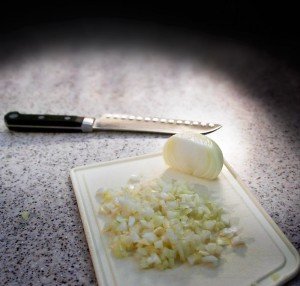By Jeanny Rhee
Summer 2014 Kaplan Award Winner

A tattoo of a Chinese character covers his right bicep. It symbolizes perseverance and patience which move in synchronization with the muscle underneath as he handles the wok atop a roaring flame, his brow furrowed and his forehead sweating.
He’s nearly unrecognizable after serving time. The last memory I have of him was driving furiously through a residential road, showing off his new BMW sports car he had just bought—with cash.
Still too young to be sitting in the front seat, my uncle—when my parents weren’t looking, allowed, even encouraged, sitting in the front seat next to him. Eager and gleefully squealing, in both a panicked and excited state, I’d shout “faster, faster!”.
I remember loving his rebellious nature, but I never imagined it’d unleash an extreme, almost exaggerated view of life, and what it had to offer.
I pull up a chair and glance at the clock. It’s almost noon and he’s been in the kitchen since 9 a.m. preparing lunch for his family of four at home. Every half hour that passes introduces aromas of sweet soy sauce, garlic, beef, and maybe a hint of rice wine.
Not a single knife, drinking cup, or a towel is out of place as he maneuvers back and forth between the thawing chicken under running water, and the sizzling beef on the wok. His gestures are casual even under the pressure of having to multi-task, and sips his coffee—black—in between watching the World Cup game, and flipping Korean-style chive pancakes on a pan.
“Being in the kitchen has been my comfort zone for the last five years,” says June Rae, a husband, father of three, and former felon. “Cooking in prison gave me solace and the chance to find my passion.”
Rae, 49, declares himself a renewed man dedicated to routine, exercise, and cooking three different meals a day for himself, but mostly for his family.
His involvement in fraud and embezzlement 15 years ago at his father’s company gave him and his family the life he thought they rightly deserved: cars and a house paid in full, business trips to Las Vegas, New York, and Los Angeles staying at the most exquisite five-star hotels, and vacations to major international cities like Hong Kong, Tokyo, and Seoul.
“Life became something that money could buy,” he says. “I wanted something more, and drugs offered that experience—a high I couldn’t achieve with money.”
Ironically, Rae attributes prison to be the only factor that stopped his own destructive habits and lifestyle, including experimenting further with narcotics. Immediately after his incarceration, Rae was transferred to Lompoc, Cali, away from his family and his previous lifestyle, life, he said, took a turn in the beginning, for the worst, but later, for the better.
The first month in prison, Rae lost weight from being unable to eat “horrendous prison food; the type of meals you imagine criminals to be served being punished by society.”
Rae applied for a kitchen position. There, he took responsibility for cooking breakfast, lunch, and dinner for nearly 1,500 prisoners. This gave him the freedom to use kitchen supplies and ingredients to prepare his own meals.
He became popular through his burrito and pizza bowls, selling each for 30 stamps—equivalent to $10 in prison currency—and the microwave became his favorite tool to make quick and simple meals.
His skills and ideas about ways to make home-cooked meals blossomed, and his creations, through word-of-mouth, became a culinary sensation in the prison grapevine.
He’d make cutting knives out of empty cans, and while this might have caused other prisoners problems, he earned privileges to use limited and expensive ingredients after becoming a personal chef to Lompoc Prison’s head Correctional Officer.
Locked up, Rae’s bitterness abated.
His newfound joy—his “high”, as he called it—became seeing faces brighten or eyes widen from taking the first bite of what he called, “prison primavera pasta.”
Rae was released from Lompoc Prison in Feb. 2014. He traveled by bus back to his home state of Wash., where his family awaited to embrace him readily if warily.
His wife of nearly 30 years, Hee Rae, is also an avid cook, and is proud of her husband’s new capabilities in the kitchen.
“He hated when I made food too salty,” she said. “But now we no longer have issues with how I cook but instead argue which dish tastes better than the other…it’s fun.”
Both compliment the other’s cookery, discuss techniques for using fire, tools, knives, and ingredients while their three children taste test each dish. They spend their weekends watching the food channel, critiquing the way supposed cooks on shows cut vegetables, and read cookbooks while enjoying meals.
Sitting in the dining table in the midst of my uncle and his family, I don’t sense the reckless side of him as he brings each carefully prepared dish from the kitchen to the table. I look at his eyes when he speaks, and the wild look I remember as a kid he once had showing instability, curiosity, and even a bit of psychotic seems to have vanished.
His eyes remain a murky color, but they’re kind, sharp, and communicative of what he’s feeling. The changes in his eyes tells me he’s ready to make serious changes and develop positive habits for the future.
Rae’s post-imprisonment plan entails working in the culinary industry to sharpen his techniques. He hopes to start a cafe and gourmet deli with his wife in the Seattle area, and to share his story of finding his passion in a situation he never would’ve imagined, where his life at first felt completely out of his control.
“I have big plans for my family and myself,” he says. “I’m thankful each day that I was able to get everything back and more through food and the art of sharing within a penitentiary.”
